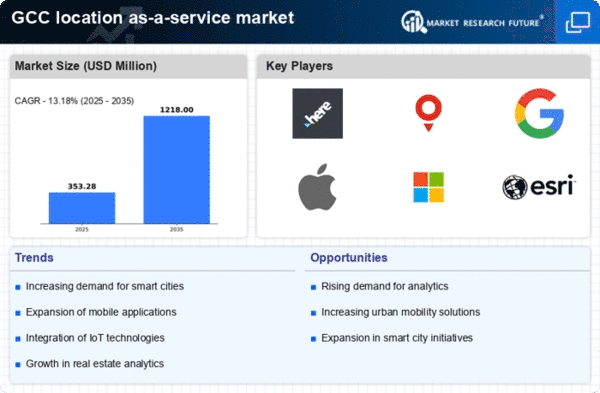Expansion of Mobile Applications
The proliferation of mobile applications is significantly influencing the location as-a-service market. With the increasing penetration of smartphones in the GCC, businesses are leveraging mobile apps to offer location-based services. This trend is evident in sectors such as transportation, where ride-hailing services have gained immense popularity. The mobile application market in the GCC is expected to reach $5 billion by 2026, indicating a robust growth trajectory. As more companies integrate location services into their apps, the demand for location as-a-service solutions is likely to rise, enabling businesses to enhance user engagement and streamline operations.
Growing Demand for Real-Time Data
The location as-a-service market is experiencing a surge in demand for real-time data analytics. Businesses across various sectors, including retail and logistics, are increasingly relying on location-based insights to enhance operational efficiency. In the GCC region, the market for real-time data solutions is projected to grow at a CAGR of approximately 15% over the next five years. This growth is driven by the need for businesses to make informed decisions quickly, optimize resource allocation, and improve customer experiences. As organizations seek to leverage location intelligence, the location as-a-service market is positioned to play a pivotal role in providing the necessary tools and platforms to facilitate this transformation.
Increased Focus on Customer Experience
Enhancing customer experience is becoming a priority for businesses in the GCC, driving the demand for location as-a-service solutions. Companies are increasingly recognizing the value of personalized services that leverage location data to meet customer needs. For example, retailers are utilizing location-based marketing strategies to target consumers with tailored offers. This trend is expected to contribute to a projected growth of 20% in the location as-a-service market over the next few years. As businesses strive to create seamless and engaging experiences, the integration of location intelligence will be crucial in achieving these objectives.
Investment in Infrastructure Development
Infrastructure development in the GCC is a critical driver for the location as-a-service market. Governments in the region are investing heavily in smart infrastructure projects, including transportation networks and urban planning initiatives. For instance, the UAE's Vision 2021 aims to create a sustainable and efficient urban environment, which necessitates advanced location-based services. The location as-a-service market is expected to benefit from these investments, as businesses seek to align their services with government initiatives. The anticipated growth in infrastructure spending, projected to exceed $200 billion in the next five years, will likely create new opportunities for location-based solutions.
Regulatory Support for Location-Based Services
Regulatory frameworks in the GCC are evolving to support the growth of location-based services, thereby positively impacting the location as-a-service market. Governments are implementing policies that encourage innovation and the adoption of advanced technologies. For instance, the Saudi Arabian government has introduced initiatives to promote smart city developments, which rely heavily on location data. This regulatory support is likely to foster a conducive environment for businesses to invest in location-based solutions. As a result, the location as-a-service market is expected to witness increased activity, with more companies entering the space to capitalize on these favorable conditions.
















